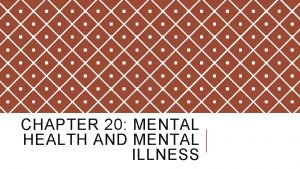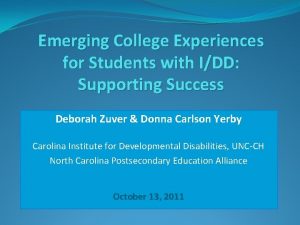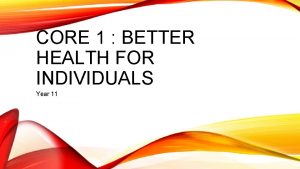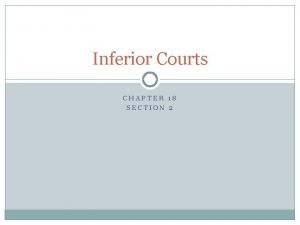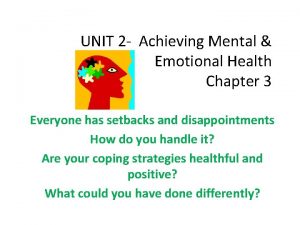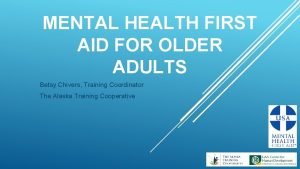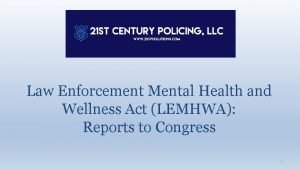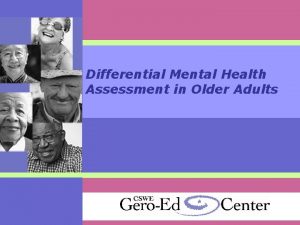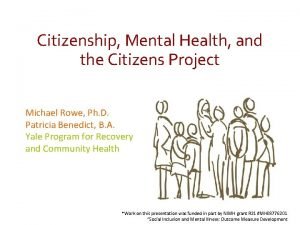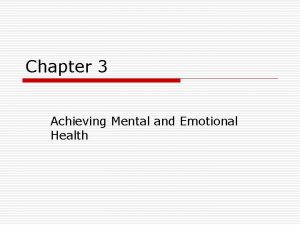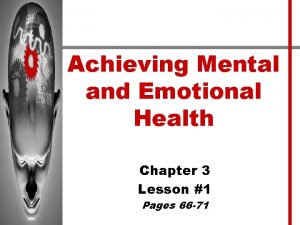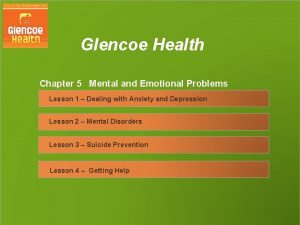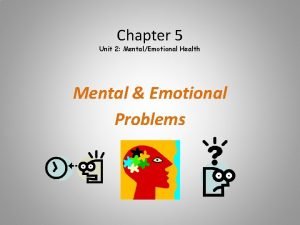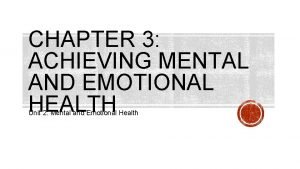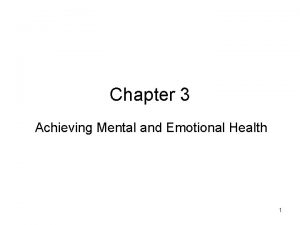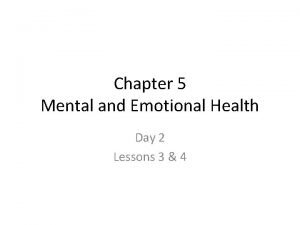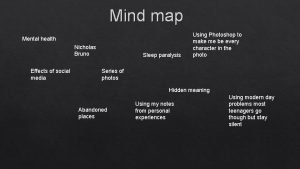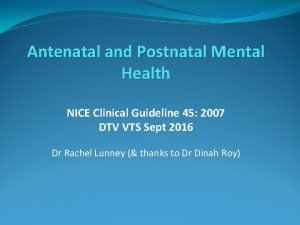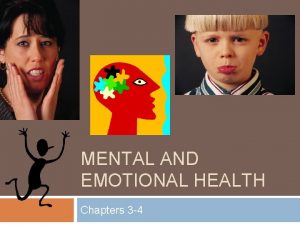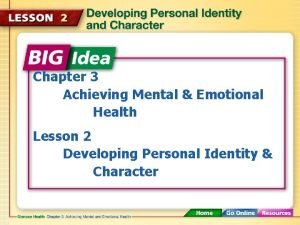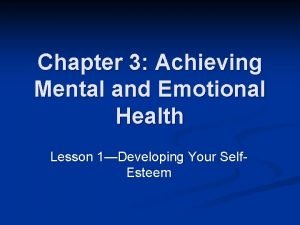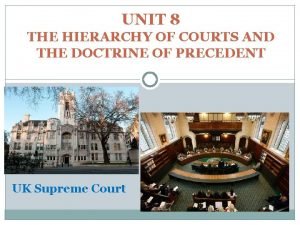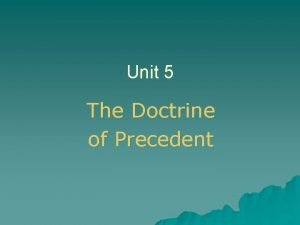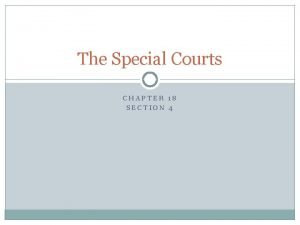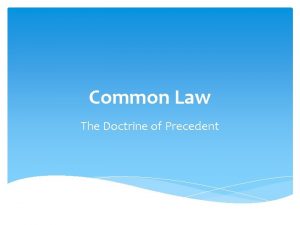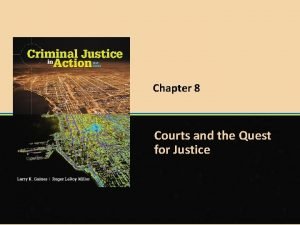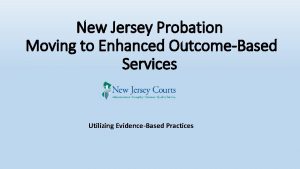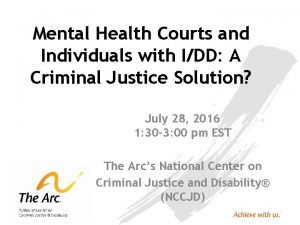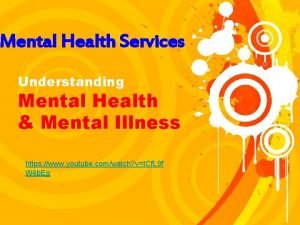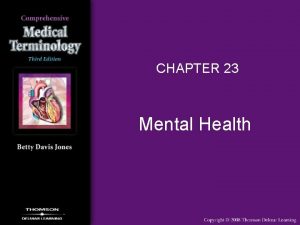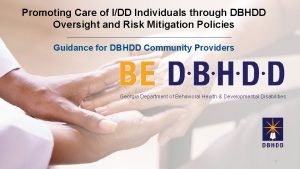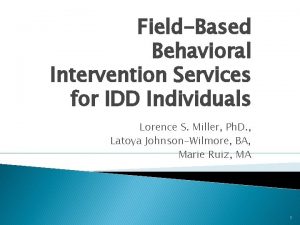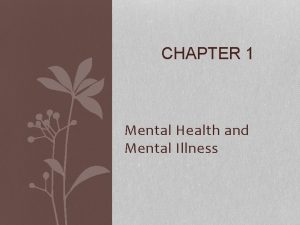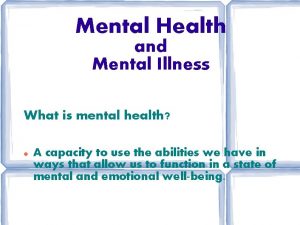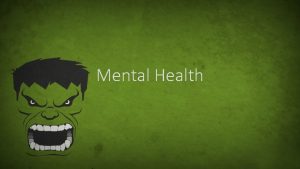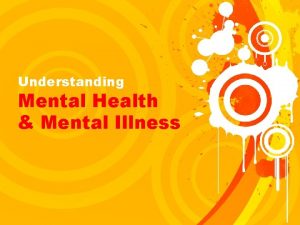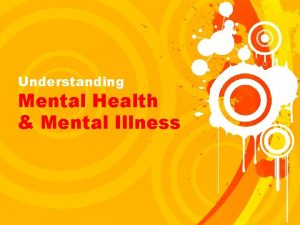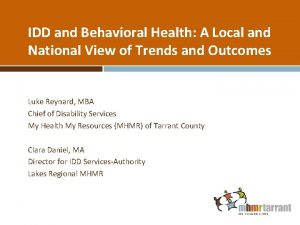Mental Health Courts and Individuals with IDD A











































- Slides: 43

Mental Health Courts and Individuals with I/DD: A Criminal Justice Solution? July 28, 2016 1: 30 -3: 00 pm EST The Arc’s National Center on Criminal Justice and Disability® (NCCJD)

Welcome to NCCJD’s Webinar • First time using webex? – You can communicate using the Chat Box and seek technical assistance if needed. – You can type questions about the material presented in the Q&A section. – Use this link for live captioning: http: //west. caption-viewer. com/nfdgaagb – Today’s webinar will be recorded and archived on the NCCJD website. Please keep this in mind when sharing information and experiences during the webinar.

Introduction The Arc’s National Center on Criminal Justice and Disability® Leigh Ann Davis, M. S. S. W. , M. P. A. , Program Manager Ashley Brompton, J. D. , Criminal Justice Fellow

Thank you to our presenters • Jennifer Baird, Program Manager, Mental Health Court of St. Lucie County, FL • Meghan Patton, Court Coordinator, Mental Health and Developmental Disabilities Court, Cuyahoga County Common Pleas Court, Cuyahoga County, OH • Adam C. Stone, Criminal Defense Attorney, Managing Partner Martin and Stone, LLC

NCCJD’s Survey of MH Courts • NCCJD conducted an informal survey of mental health courts in 6 states (FL, OH, TX, IL, NM, and CA) • 47 respondents • Results: – 8 did not serve people with I/DD – 15 accepted people with I/DD even without a mental illness – 15 accepted people with I/DD ONLY if they had a primary diagnosis of mental illness (Axis I) – The rest accepted people with I/DD on a case by case basis – Only 2 of the courts indicated that they had specific programs in place for individuals with I/DD

History of Mental Health Courts Jennifer Baird, LCSW

What are Mental Health Courts? • Mental Health Courts (MHC) are problemsolving initiatives • Seek to address the root causes that contribute to criminal involvement relating to mental illness • Focuses on those with mental illness and intellectual disabilities (ID).

History of Mental Health Courts • In 1997, Broward County, FL started the first recognized Mental Health Court. • Developed as a response to: – Jail overcrowding – Critical problems faced by mentally ill inmates – High prevalence of inmates with co-occurring mental health and substance abuse disorders. • Numerous mental health courts have started since 1997.

MHC St. Lucie County, FL • Started in 2006 with 6 participants • Currently has 183 participants • Developed in connection with community partners due to: – Revolving door of mentally ill inmates in jail – To reduce jail crowding – To be rehabilitative for the mentally ill population • Felony and Misdemeanor court

MHC St. Lucie County, FL • Clients are considered for MHC based on their history of hospitalizations, previous psychiatric records, previous convictions/arrests, current and past mental health diagnoses. • Any cases involving a victim must have the victim’s agreement for the case to be considered for MHC. • The State Attorney acts as the gatekeeper for Mental Health Court.

MHC St. Lucie County, FL • Client can be referred to MHC by: – Public defender – State attorney – Private Attorney – Jail – Community Providers – Family – Probation

MHC St. Lucie County, FL • Clients enter mental health court several ways – Diversion: Charges are nolle pros when program completed – Condition of probation: Jurisdiction ends when probation is complete – Condition of Release/Pre-trial: Monitor clients until case is resolved – NGI/ITP-CR: Assist Forensic Services with monitoring clients on conditional release

MHC St. Lucie County, FL • Clients are assigned a court manager who assess each client and make community referrals based on the individual’s specific needs such as – Psychiatric services – Therapy – Substance Abuse treatment – Case management – Link to community resources such as Agency for Persons with Disabilities – Peer Support

Goals for MHC • Assist clients with learning how to access existing service providers • Remove barriers to access for client services • Strive to balance treatment and accountability • Decrease the rate of mentally ill clients returning to jail • Increase community safety

Benefits to ID Clients • MHC benefits our ID clients because we work closely with community partners to provide consistency and repetition for our clients. • MHC holds agencies responsible for the timely access to services and the quality of services provided. • MHC provides clients with a less structured court environment so ID clients have enough time to ask questions and talk with the judge to understand the expectations/requirements of the court.

PRACTICAL CHALLENGES FACING MENTAL HEALTH COURTS Adam C. Stone, Managing Partner MARTIN & STONE, LLC

PRACTICAL CHALLENGES FACING MENTAL HEALTH COURTS 1. Identifying Clients and Defendants with I/DD a. What is the scope of your mental health court’s experience with I/DD? i. who are you serving? ii. is your court and personnel/staff qualified to serve I/DD? iii. what is your MH Court’s relationship like with the your local Board of Developmental Disabilities? b. Who is managing the expectations of the providers within the MH Court?

PRACTICAL CHALLENGES FACING MENTAL HEALTH COURTS 2. Is your MH Court equipped to provide the necessary services to I/DD clients and Defendants? a. Well-Intended People (Lawyers, Social Workers, APS, CPS, and Board of DD) b. Qualifications and Training for Lawyers to Defend I/DD Clients (IAC Claims, Malpractice, Ethical Issues) c. Follow Through: Who is ensuring that the client is following through with the services? Qualified?

PRACTICAL CHALLENGES FACING MENTAL HEALTH COURTS 3. How does the MH Court Measure Outcomes and Define Success? a. How do we as “the criminal justice system” balance the safety of the public, the rights of the Defendant and the overwhelming needs of these individuals? b. How do we or the Court manage the relationships between APS, CBS, Lawyers, Bof. DD; and avoid the inter-conflict that comes when everyone in the room knows best?

PRACTICAL CHALLENGES FACING MENTAL HEALTH COURTS 4. FINALLY AND MOST IMPORTANTLY: WHO IS FOOTING THE BILL? a. Guardianships? Establishment of SSDI? b. Stability: Work, Home, Routine? Who is responsible? c. Ake v. Oklahoma Expert Fees Motions: neuropsychologists, psychiatrists, professors and scientists d. DEFENDING YOUR CLIENT FIRST AND FOREMOST

Cuyahoga County Common Pleas Mental Health and Developmental Disabilities Court Meghan Patton MHDD Court Coordinator

National and Local Perspective Mental Health Courts were created largely in response to the increasing numbers of defendants with serious mental illness entangled in the criminal justice system. Ø When mental health facilities disappeared in the 1980 s and 1990 s, law enforcement departments, jails, and prisons, became de facto service providers to persons with mental illness. Ø Authoritative research estimates that approximately 800, 000 persons with serious mental illness are admitted annually to U. S. jails. Ø Presently, more than 10, 500 inmates in Ohio prisons suffer from mental illness: More than 1 in 5 have a diagnosable mental illness and 1 in 12 has a serious and persistent condition. Ø There are 10 times as many mentally ill inmates as there are patients in Ohio’s 6 psychiatric hospitals.

What is the Role of Mental Health Court? The role of Mental Health Courts is to protect the public by addressing the mental illness (and in our case developmental disability of a defendant) that contributed to the criminal act. – Break the cycle of the mentally ill / DD being entangled by the criminal justice system by expanding and focusing on community-based solutions. – Provide effective and therapeutic options for the defendant rather than punitive sanctions. – Invest in intensive treatment modalities that assist the defendant to address their mental illness, disabilities, drug abuse, lack of housing and employment, criminal thinking, and other crimogenic needs.

Mental Health and Developmental Disabilities (MHDD) Court History Ø 1980 s: Due to increased numbers of defendants suffering from MH and DD issues in the criminal justice system, the Cuyahoga County’s Probation Department created the MDO (mentally disorder offenders) and MRO (mentally retarded offenders) supervision units. Ø 2002: Suburban court partners and community stakeholders created the Mental Health Initiative. This collaboration was to identify existing programs and services, identify gaps, expand resources, enhance communication and training that serves the MHDD population. Ø June 9, 2003: The Cuyahoga County Common Pleas Court established the MHDD Court after gaining knowledge and planning from the MH Initiative. Amendments were made to the Local Rules to include the changes (30, 30. 1, and 33). Ø Late 2000 s: The MDO and MRO probation units were renamed the Mental Health and Developmental Disabilities probation unit as a way to promote appropriate terminology for the community it represents. Ø 2015 -2016: MHDD Court will apply for Supreme Court’s Specialized Docket Certification and begin to analyze court outcomes with the assistance of Case Western Reserve University.

MHDD Court’s Mission Statement “The mission of the Mental Health and Developmental Disabilities Court is to promote early identification of defendants with severe mental health and/or developmental disabilities in order to promote coordination and cooperation among law enforcement, jails, community treatment providers, attorneys, and courts for defendants during the legal process and achieve outcomes that both protect society and support mental health care and disability needs of the defendant. ” MHDD Court Goals 1. Increase community safety for Cuyahoga County. 2. Improve continuum of programming. 3. Continue and increase collaboration with community agencies and partnerships. 4. Continue to increase early identification and engagement process. 5. Improve defendant’s supervision engagement and compliance. 6. Improve defendant’s long term participation with behavioral health agencies.

0 Local Rules 30, 30. 1, 3333 • Common Pleas Court created Local Rules to implement the MHDD Court. Local Rule 30: Assignment of Criminal Cases • Local Rule 30. 1: Assignment of Criminal Cases to MHDD Court dockets a. Definition b. Appointment of judges to preside over MHDD Court dockets Judge Hollie L. Gallagher (Chair) Judge Michael P. Donnelly Judge Robert Mc. Clelland Judge Deena R. Calabrese Judge Cassandra Collier-Williams c. Assignment of cases to MHDD Court dockets d. Cases will not be assigned to MHDD Court dockets • Local Rule 33: Assignment and compensation of counsel to defend

MHDD Court Eligibility Requirements Mental Health Diagnosis A defendant to suffer from a psychotic-spectrum mental illness. Examples: v Brief Psychotic Disorder v Schizophreniform Disorder v Schizophrenia v Schizoaffective Disorder v Bipolar I Disorder with Mood Congruent Psychotic Features Developmental Disability Diagnoses v. Intellectual Disability (Mild, Moderate, Severe, Profound) and/or an adaptive skills deficit based on a diagnostic report. v. Unspecified Intellectual Disability v. Borderline Intellectual Functioning (if Full Scale IQ score is 75 or lower) v. Autism Spectrum Disorder (e. g. , Asperger's Disorder) v. Tic Disorder (e. g. , Tourette's Disorder) v. Major or Mild Neurocognitive Disorder (with onset prior to age 22)

2015 MHDD Court Statistics • 72% of all “Mental Health” designations went to MHDD Court Judges. • The MHDD Court judges dockets consisted of 45% of MHDD defendants (approximately 150 cases at anyone time). • 136 MHDD defendants were placed on Court Supervised Release as a condition of bond. • 442 MHDD defendants were placed into MHDD supervision, 293 defendants came directly from the MHDD Court judges. • MHDD Probation typically serves 750 MHDD defendants at any one time, approximately 550 are directly from MHDD Court. • Defendants in MHDD Court are similar to the overall offender population in distribution of race. However, a higher percentage of females defendants are found on the MHDD Court than in the overall offender population. • Defendants may struggle with chronic homelessness, are often unemployed, and indigent.

MHDD Court Early Track Any action from arrest to sentencing The MHDD Court’s mission is to serve all defendants who may suffer from a severe mental illness or developmental disability regardless of the outcome of their case. As one of the largest urban counties within the state of Ohio, the court functions differently than smaller felony courts and offers a unique approach to serving this population. Historically, the MHDD Court has placed a high importance of promoting early identification of defendants who meet the clinical criteria prior to arraignment and throughout the pretrial process. This practice, named MHDD Court Early Track, allows for cases that have been identified as clinically eligible to be assigned or transferred to a MHDD Court judge and provided a MHDD Court trained and certified assigned attorney. This practice allows for all eligible defendants to receive specialized services that have been developed throughout the court system. Once a defendant is granted community control sanctions and is clinically and legally eligible, they will enter into the MHDD Court's Official Admission.

MENTAL HEALTH COURT INITIATIVE Points of Identification, Assessment, Case Review & Access to Service hospital Jail CIT Incident Complaint option reported Booked filed and/or or observed arrest Prosecutor reviews case Bail Jail Bound over to Grand Jury Bail Information or Indictment Felony: Initial Appearance/ Preliminary Hearing Sentencing (3 D) Jail Bail December 10, 2001 Initial Appearance In Municipal Court Plea Bail Jail Arraignment *Assign MH Judge & atty. Felony - skip 3 spaces Plea / Trial Pre-sentence Pretrial Hearings *Competency Investigation / Assessments/ *assessment and/or Sentencing by CPC NGRI state hospital Prison Jail Fine Probation *MHDD supervision

Local Responses: Case Flow Entry From arrest to disposition and community control supervision, many specialized services have been developed for defendants with serious mental illness and developmental disabilities. Due to this high level of collaboration, criminal justice entities have developed several intercept points to create swift access to behavioral health measures: • County Jail • Bond Commissioner’s Office • Alcohol, Drug, and Mental Health Service Board (ADAMHS) and behavioral health agencies • Cuyahoga County Board of Developmental Disabilities (CCBDD) • Court Psychiatric Clinic • Inpatient / Outpatient programming and resources

Local Responses: Case Flow Entry County Jail Responses Ø County Jail included MHDD screening questions to the booking process. Ø County Jail’s Intake Specialist tracks and refers inmates to their existing community provider, to jail psychiatric services, and/or eligibility determination. Ø County Jail has psychiatric medical staff on duty and has approximately 65 beds for acute MHDD defendants available. Ø Alcohoal, Drug, and Mental Health Services (ADAMHS) Board and Cuyahoga County Board of Developmental Disabilities (CCBDD) electronically receives and reviews daily booking list to assist with notification of clients in the county jail. Ø Forensic Jail Liaisons from behavioral health agencies (Recovery Resources, Frontline Services Inc, Connections, The Centers, Murtis Taylor, CCBDD, Metro Hospital) are located in the county jail to assist obtaining existing reports from their agency, providing linkage and release planning, working closely with MHDD Judges and Probation staff in team staffings.

Local Responses: Case Flow Entry Bond Commissioner’s Office: Ø Bond officers incorporated MHDD screening questions during their interview process. If the defendant answers positively to any of these questions, the bond officer will refer the defendant to jail liaisons for further eligibility determination. Arraignment Room: Ø The Arraignment room and the Pretrial Treatment Service & Probation Coordinator work together to provide the most updated information on whether a defendant qualifies for MHDD Court dockets. Ø If it is determined that they qualify for MHDD Court, the Arraignment room will automatically assign an MHDD Court judge to the case. Ø A specially trained MHDD attorney is often assigned at arraignment even if eligibility determination has not been made yet, but is expected. Probation Coordinator / Eligibility Review: Ø Eligibility Determination can be requested through attorney referrals, bond investigation, jail liaisons, jails psychiatrist, Court Psychiatric Clinic reports, previous placement on MHDD Court/probation. We verify the eligibility, flags the case, and notify the arraignment room or judge assigned. Ø To indicate the presence of MHDD eligibility, individuals have been flagged as “Mental Health” in the Court’s information system to allow for more expedient identification and linkage to services. More than 5, 101 cases have been flagged since its conception. Ø This position reviews approximately 1, 000 cases per year for eligibility determination.

MHDD Court Official Admission Once a defendant is found legally eligible, they may be granted community control sanctions at the discretion of the MHDD Court judge presiding over the case. Once this transpires, a defendant will enter the MHDD Court’s Official Admission Legal Eligibility Guidelines Ø Any felony or misdemeanor level offense for which a defendant may receive a community control sanction. Ø Plea of guilty as charged or as required by a plea agreement Ø Judicial Release status Ø Defendants, if eligible, may be placed into MHDD Court pursuant to program eligibility terms for Diversion, Intervention in Lieu, or Early Intervention Programs. Ø All risk scores as identified through the Ohio Risk Assessment System (ORAS) are acceptable Ø Exclusions: Not Guilty by Reason of Insanity (NGRI), Incompetent to Stand Trial (ISTU), unrestorable (These cases are still disseminated within MHDD Court, but not considered part of the official admission).

MHDD Court’s Therapeutic Approaches The MHDD Court monitors a defendant’s performance and progress through judicial interactions and therapeutic approaches known as treatment team staffing hearings. Ø Each Judge has 2 Treatment Team staffings per month. Team meetings are to be proactive problem solving session with non-adversarial approaches for all members. Ø The Treatment team meets immediately before MHDD Court hearings to discuss or “roundtable” the defendant’s progress, possible violations, recognition of the defendant’s accomplishments, etc. , as a team. Ø Monitors the defendant’s progress through designated phases with appropriate incentives and sanctions. Ø Team establishes and reinforces the MHDD Court policies and ensures effective and efficient supervision of a defendant. Ø MHDD Court strives to provide defendants with an opportunity to learn and manage their mental illness / DD from each other through participation in court hearings. Ø Team allows other members (e. g. new POs or judges) to learn from each other in order to have an effective model of collaboration and to provide continuum of care for the defendant.

MHDD Court Team Members The following are the treatment team members: Ø Ø Ø Ø Ø MHDD Court judge(s) MHDD Court Coordinator Probation Supervisor(s) (2 supervisors) Probation Officers (10 MH officers / 3 DD Officers) Forensic Jail Liaisons from five BH agencies County Jail Mental Health Specialist Behavioral Health case managers (CPSTs, Support Administrators – SAs) Public Defender, Assigned, or Retained Counsel Public Defender Social Worker Assistant Prosecutor (mainly during MHDD Court early track)

MHDD Court Length and Phases • Low, Low-Moderate Risk (to recidivate), and Intervention in Lieu defendants are placed on Community Control for 1 year and should completed approximately 100 to 150 hours of programming • High Risk and Moderate Risk (to recidivate) defendants are placed on Community Control for 2 years and should complete approximately 200 to 300 hours of programming. Phases are the steps in which a defendant’s performance and progress through the MHDD Court is monitored. The phases are guides to meet defendant’s individual needs. Ø Ø Ø Phase 1: Orientation Phase 2: Stabilization and Development Phase 3: Programming Phase 4: Maintenance / Completion Phase Successful Termination (Graduation)

MHDD Court Benefits • Community Provider agencies accept forensic clients and work closely with MHDD POs. Officers and case managers attend monthly clinical staffings in order to create a culture of coordinated care. • MHDD designated residential and out-patient treatment services. • Regular MH, Ao. D, Criminal Justice meetings with ADAMHS Board and CCBDD. • Resource awareness and relationships with Cleveland Police Crisis Intervention Team officers, St. Vincent’s Psych ER, Crisis Stabilization unit, Nort. Coast Behavioral Healthcare (state hospital), etc. • Officers work closely with MHDD Court bailiffs and judges. • Officers address mental health/DD linkage or issues, housing concerns / placement, substance abuse, criminal thinking, criminal peers, education, employment, finances, leisure time, and any other issues.

Partnership with the Cuy Co. Board of Developmental Disabilities • Forensic Unit consists of Municipal and County Court community and jail liaisons. • Assists individuals with disabilities who become involved in the criminal justice system. • Early identification in the criminal justice system, consultation throughout the court proceedings, re-entry linkage with community-based services and facilitating successful outcomes in parole/probation. • Understands legal system, its players and priorities • Sees that issues relevant to the individual’s disability are brought to the attention of the court and defense attorney. • Awareness of and connection with the community resources that provides the court with sentencing and probation alternatives.

Current Gaps Remain • Defendants that have an eligible DD diagnosis, but NOT eligible for the CCBDD = Not many available resources. • More effective programming/assistance for DD defendants not eligible for Board in regards to decision making, anger management, housing, employment, etc. • Further research on how defendants with developmental disabilities far within specialized courts. Different alternatives for how treatment teams interact with DD offenders vs. MH offenders. • Continue to create appropriate resources to reduce the number of severely mentally ill and developmental disabilities incarcerated in the county jail.

MHDD Court Team members and clients “Mental Illness is nothing to be ashamed of, but stigma and bias shame us all. ” President Bill Clinton The severity of one’s disability does not determine their level of potential. The greatest barriers that persons with disabilities have to overcome are not steps or curbs, it’s expectations. Karen Clay

Presenter Contact Information • Jennifer Baird - Baird. J@stlucieco. org • Adam Stone - adamstonelawfirm@gmail. com • Meghan Patton - CPMEP@cuyahogacounty. us

Questions? • Register for the next webinar on competency – September 22 nd at 1 -3 pm Eastern! Register here: https: //thearc 2. webex. com/thearc 2/ons tage/g. php? MTID=e 451005 e 7 bc 1 f 100340 a c 1 c 6 bdfbf 5 c 65 • Sign up to receive email alerts, use I&R/TA service, and refer others • Our website: www. thearc. org/NCCJD Contact us at: NCCJDinfo@thearc. org
 Mental health and mental illness chapter 20
Mental health and mental illness chapter 20 Idd training and competence requirements
Idd training and competence requirements Mental health jeopardy game
Mental health jeopardy game Idd 15 timmar system
Idd 15 timmar system Idd questionnaire
Idd questionnaire Idd questionnaire
Idd questionnaire Idd college
Idd college Better health for individuals
Better health for individuals Circuit court maps
Circuit court maps Chapter 3 achieving mental and emotional health answer key
Chapter 3 achieving mental and emotional health answer key Mental health and older adults
Mental health and older adults Law enforcement mental health and wellness act
Law enforcement mental health and wellness act Mental health and older adults
Mental health and older adults Mental health and citizenship
Mental health and citizenship Chapter 3 achieving mental and emotional health
Chapter 3 achieving mental and emotional health Chapter 21 mental health diseases and disorders
Chapter 21 mental health diseases and disorders Chapter 3 mental and emotional health
Chapter 3 mental and emotional health Psychology, mental health and distress
Psychology, mental health and distress Mental health policy, plans and programmes michelle funk
Mental health policy, plans and programmes michelle funk Glencoe health chapter 5 mental and emotional problems
Glencoe health chapter 5 mental and emotional problems Chapter 5 mental and emotional problems lesson 2 answer key
Chapter 5 mental and emotional problems lesson 2 answer key Chapter 3 mental and emotional health answer key
Chapter 3 mental and emotional health answer key Chapter 3 achieving mental and emotional health
Chapter 3 achieving mental and emotional health Chapter 15 achieving mental and emotional health answer key
Chapter 15 achieving mental and emotional health answer key Chapter 15 achieving mental and emotional health
Chapter 15 achieving mental and emotional health Mind map on mental health
Mind map on mental health Nice antenatal and postnatal mental health
Nice antenatal and postnatal mental health Chapter 3 mental and emotional health
Chapter 3 mental and emotional health Chapter 3 achieving mental and emotional health
Chapter 3 achieving mental and emotional health Chapter 3 achieving mental and emotional health
Chapter 3 achieving mental and emotional health Chapter 3 achieving mental and emotional health
Chapter 3 achieving mental and emotional health Chapter 3 achieving mental and emotional health
Chapter 3 achieving mental and emotional health Chapter 15 achieving mental and emotional health
Chapter 15 achieving mental and emotional health British court hierarchy
British court hierarchy Courts hierarchy
Courts hierarchy Doctrine of precedent
Doctrine of precedent Chapter 18 section 4 the special courts
Chapter 18 section 4 the special courts Tennis courts wolverhampton
Tennis courts wolverhampton 3 types of courts in india
3 types of courts in india Courts hierarchy
Courts hierarchy 4 levels of state courts
4 levels of state courts Arizona fare payment
Arizona fare payment Courts hierarchy
Courts hierarchy New jersey courts
New jersey courts
